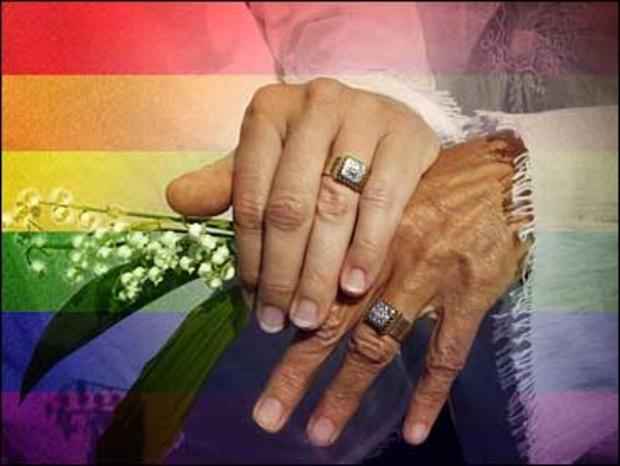Prop. 8 Ruling: "Fantastic" Decision or "Judicial Activism"?
Political commentators had a wide array of reactions to District Judge Vaughn Walker's ruling yesterday that California's Proposition 8, which bans same-sex marriage, is unconstitutional. Liberals praised both the decision and the details of Walker's written opinion, while conservatives decried it as judicial activism.
"Today is one of those rare seminal days where something important and something good has occurred. Fantastic," blogger "bmaz" wrote on the liberal site FireDogLake. "The beauty and joy of equality, due process and equal protection under the Constitution of the United States of America."
Dahlia Lithwick of Slate commended Walker's ruling for relying on "matters rooted in logic, science, money, social psychology, and fact." She blasted the defenders of Proposition 8 for doing "little more than fire up their big, gay boogeyman screensaver for two straight weeks" while making their case. She also noted that Walker's written opinion is seemingly aimed to appeal to Supreme Court Justice Anthony Kennedy, who often serves the high court's swing vote.
The ruling will definitely be appealed -- and some supporters of same-sex marriage responded to yesterday's ruling by remarking that a drawn out court battle is not the wisest way to win gay rights.
Blogger "Allahpundit" on the conservative site Hot Air writes that he supports same-sex marriage and thinks the court battle is a "needless mistake."
"The optics are uniquely bad -- a federal judge imperiously tossing out a public referendum enacted by citizens of one of the bluest states in America," he wrote. "The real effect of this decision, assuming it's upheld on appeal, will be to let gay-marriage opponents claim that they were cheated in a debate that they were losing and bound to lose anyway. That's what's called a pyrrhic victory. Too bad."
Indeed, many conservatives decried yesterday's ruling as unfair.
Chuck Donovan of the Heritage Foundation called the ruling "an example of extreme judicial activism" and "an affront to the millions of California voters who approved Proposition 8 in 2008 after months of vigorous public debate."
The National Organization for Marriage, which is against same-sex marriage, attacked Walker's decision based on his sexuality.
"The 'trial' in San Francisco in the Perry v. Schwarzenegger case is a unique, and disturbing, episode in American jurisprudence," Maggie Gallagher, Chairman of the Board of NOM, said in a statement. "Here we have an openly gay (according to the San Francisco Chronicle) federal judge substituting his views for those of the American people and of our Founding Fathers who I promise you would be shocked by courts that imagine they have the right to put gay marriage in our Constitution. We call on the Supreme Court and Congress to protect the people's right to vote for marriage."
While Walker's personal life may suggest his own views are liberal, David Boaz of the libertarian Cato Institute points out that he has had the support of staunch conservatives.
"In fact, Judge Walker was first appointed to the federal bench by President Ronald Reagan in 1987, at the recommendation of Attorney General Edwin Meese III (now the Ronald Reagan Distinguished Fellow in Public Policy and Chairman of the Center for Legal and Judicial Studies at the Heritage Foundation)," Boaz writes. "Democratic opposition led by Sen. Alan Cranston (D-CA) prevented the nomination from coming to a vote during Reagan's term. Walker was renominated by President George H. W. Bush in February 1989. Again the Democratic Senate refused to act on the nomination. Finally Bush renominated Walker in August, and the Senate confirmed him in December."
